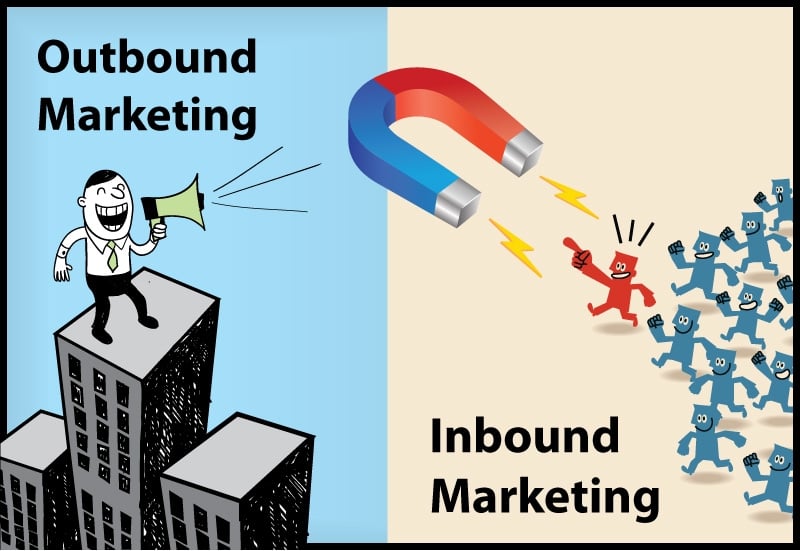Marketing Tactics for UK Manufacturers in a Changing Landscape
by Will Williamson on 08-May-2024 16:07:00
 The manufacturing sector here in the UK – and internationally – is poised on the edge of a seismic shift, in which data-driven decision making, automation, and digitalisation are transforming the way that businesses manage production and promote their services. For manufacturing SMEs and service providers, this changing landscape presents a range of opportunities which, if harnessed effectively, can instigate strong growth in sales.
The manufacturing sector here in the UK – and internationally – is poised on the edge of a seismic shift, in which data-driven decision making, automation, and digitalisation are transforming the way that businesses manage production and promote their services. For manufacturing SMEs and service providers, this changing landscape presents a range of opportunities which, if harnessed effectively, can instigate strong growth in sales.
In what ways can digital marketing support manufacturing businesses to thrive in the modern economy?
Building Brand Awareness On Social Media
‘Brand’ is a specific thing for manufacturing businesses. While most often associated with visual image and style, for manufacturers ‘brand’ is more than this. Your brand is your professional credibility, as expressed by your company story and background, your service record, your accreditations and certifications, and your track record for innovation. Social media is a good way of demonstrating this credibility in a changing industry, responding in real time to news, emerging technologies, and events, and showing that your business has the means of ‘walking the walk’, not just ‘talking the talk’.
Tips:
- Choose the right platforms: LinkedIn is a natural fit for manufacturing B2B outreach, while Instagram is a good platform for showcasing the visual aspects of your products and business model.
- Use content narratives: use your social media content to tell compelling business and project stories. Visual content and videos, behind-the-scenes glimpses of your facility, and regular testimonials can all contribute to a richer narrative that increases the credibility of your brand, while injecting consistency into your content.
Using Data To Make Better Marketing Decisions
Data is a means of better understanding your market and customer base. The advanced analytics tools provided by platforms such as HubSpot can give you valuable insights into customer behaviour and preferences, your website performance, and even the effectiveness of your marketing campaigns.
Tips:
- Precision segmentation: divide your customer base into segments according to their purchase behaviours and interests. This segmentation enables you to tailor your marketing content and outreach for the best results.
- Predictive modelling: predictive models help you foresee trends and anticipate customer needs, providing essential insight at a time of rapid change. By doing so, you can adapt your offerings and messages to meet your customers’ current needs, thereby increasing conversion rates.
- Customer feedback loops: surveys, customer reviews, and social media monitoring provide unfiltered insights that are instrumental in refining your marketing strategy and improving your customer experiences. Acting on the insights you gather can enhance the competitiveness of your products and business.
- Communicate improvements: Sharing how you responded to customer feedback is a powerful way of building trust and loyalty. Customers appreciate when their input is taken seriously, and it can often lead to stronger and more enduring relationships.
Customer-Centric Marketing, 2024 Style
Digital marketing has always been about personalisation and customer centricity, and for manufacturers, this can present a conundrum. Manufacturing, traditionally, is a product-focused sector, and while you can sell the benefits and value of a product through marketing, ultimately, a customer will either want your product, or they won’t. So where does personalisation and customer-focus fit into marketing for manufacturers?
Tips:
- Personalise the customer experience: the customer experience and buyer journey is unique for each customer, even if the product you sell is the same for all customers. Marketing gives you the capability of personalising the customer experience to precisely meet the challenges, constraints, and aspirations of tightly defined customer groups. This is important because it helps to keep your products and services relevant at a time of radical change, empowering you to not just sell features and benefits, but to genuinely explain the ways in which a product or service can help your customers to grow and thrive. This subtle shift makes your marketing content more about them than about you, which can make it easier for your team to close deals.
- Strategic use of technology: marketing itself has changed over the past few years, and so for manufacturers, investing in technology that enhances the customer experience can boost your brand profile and B2B sales. You don’t have to spend capital on every new tool and gadget. However, modern CRM systems and automation platforms, data analytics tools, and AI productivity tools can help you in several ways, offering deeper insights into customer behaviour, streamlining your communications, and reducing the cost of marketing. Investing in the right technology stack can boost the efficiency and effectiveness of all your customer centric marketing initiatives.
Seizing The Opportunities
Digital marketing has never been a more promising field for British manufacturers. If you’d like to find out more about marketing and how it can help equip your business for growth in 2024 and the years to come, please contact one of our specialists today by calling 01332 982022.
- Inbound Marketing (SEO, PPC, Social Media, Video) (832)
- Strategy (368)
- Sales & CRM (197)
- Marketing Automation & Email Marketing (192)
- Business Growth (168)
- Website Design (162)
- Hubspot (141)
- Lead Generation (117)
- Google Adwords (100)
- Content Marketing (94)
- Conversion (53)
- Case Studies (49)
- News (47)
- Ecommerce (39)
- Webinars (36)
- SEO (27)
- AI (21)
- Events (19)
- LinkedIn Advertising (17)
- Video (17)
- Video Selling (15)
- Software training (13)
- Niche business marketing (11)
- The Digital Prosperity Podcast (10)
- Facebook Advertising (8)
- HubSpot Case Studies (7)
- Web Design Case Studies (1)
- February 2026 (9)
- January 2026 (12)
- December 2025 (15)
- November 2025 (6)
- October 2025 (17)
- September 2025 (16)
- August 2025 (14)
- July 2025 (14)
- June 2025 (5)
- May 2025 (19)
- April 2025 (15)
- March 2025 (13)
- February 2025 (13)
- January 2025 (8)
- December 2024 (2)
- November 2024 (4)
- October 2024 (21)
- September 2024 (4)
- August 2024 (8)
- July 2024 (14)
- June 2024 (16)
- May 2024 (25)
- April 2024 (15)
- March 2024 (18)
- February 2024 (5)
- January 2024 (10)
- December 2023 (6)
- November 2023 (10)
- October 2023 (13)
- September 2023 (12)
- August 2023 (14)
- July 2023 (13)
- June 2023 (14)
- May 2023 (15)
- April 2023 (13)
- March 2023 (14)
- February 2023 (13)
- January 2023 (15)
- December 2022 (13)
- November 2022 (6)
- October 2022 (8)
- September 2022 (22)
- August 2022 (15)
- July 2022 (13)
- June 2022 (16)
- May 2022 (14)
- April 2022 (16)
- March 2022 (17)
- February 2022 (11)
- January 2022 (8)
- December 2021 (6)
- November 2021 (7)
- October 2021 (11)
- September 2021 (10)
- August 2021 (7)
- July 2021 (7)
- June 2021 (4)
- May 2021 (4)
- April 2021 (1)
- March 2021 (3)
- February 2021 (5)
- January 2021 (4)
- December 2020 (7)
- November 2020 (6)
- October 2020 (5)
- September 2020 (9)
- August 2020 (18)
- July 2020 (17)
- June 2020 (17)
- May 2020 (10)
- April 2020 (21)
- March 2020 (24)
- February 2020 (21)
- January 2020 (12)
- December 2019 (23)
- November 2019 (12)
- October 2019 (14)
- September 2019 (16)
- August 2019 (15)
- July 2019 (13)
- June 2019 (6)
- May 2019 (8)
- April 2019 (4)
- March 2019 (2)
- February 2019 (2)
- January 2019 (2)
- December 2018 (3)
- November 2018 (24)
- September 2018 (11)
- August 2018 (9)
- June 2018 (3)
- May 2018 (6)
- April 2018 (14)
- March 2018 (12)
- February 2018 (16)
- January 2018 (15)
- December 2017 (15)
- November 2017 (18)
- October 2017 (23)
- September 2017 (19)
- August 2017 (28)
- July 2017 (27)
- June 2017 (25)
- May 2017 (18)
- April 2017 (17)
- March 2017 (16)
- February 2017 (17)
- January 2017 (14)
- December 2016 (21)
- November 2016 (27)
- October 2016 (25)
- September 2016 (16)
- August 2016 (20)
- July 2016 (19)
- June 2016 (14)
- May 2016 (20)
- April 2016 (24)
- March 2016 (22)
- February 2016 (28)
- January 2016 (27)
- December 2015 (28)
- November 2015 (19)
- October 2015 (9)
- September 2015 (12)
- August 2015 (5)
- July 2015 (1)
- June 2015 (10)
- May 2015 (3)
- April 2015 (11)
- March 2015 (14)
- February 2015 (15)
- January 2015 (12)
- December 2014 (2)
- November 2014 (23)
- October 2014 (2)
- September 2014 (2)
- August 2014 (2)
- July 2014 (2)
- June 2014 (7)
- May 2014 (14)
- April 2014 (14)
- March 2014 (7)
- February 2014 (2)
- January 2014 (7)
- December 2013 (9)
- November 2013 (14)
- October 2013 (17)
- September 2013 (3)
- August 2013 (6)
- July 2013 (8)
- June 2013 (4)
- May 2013 (3)
- April 2013 (6)
- March 2013 (6)
- February 2013 (7)
- January 2013 (5)
- December 2012 (3)
- November 2012 (2)
- September 2012 (1)
Subscribe by email
You May Also Like
These Related Blogs

Inbound Marketing Vs Outbound Marketing - Is Outbound Marketing Dead?
Marketing tactics to consumers and clients are changing rapidly. It’s not about asking, “Hey, do you want to buy this product or use these services?” …

Why Does Social Media Marketing For Manufacturers Matter?
In little over a decade, social media has become an integral part of everyday life for businesses. These platforms are no longer seen as a source of e …

Content Marketing VS Inbound Marketing: What's The Difference?
If you work in marketing I’m sure you will have heard the term Content Marketing VS Inbound Marketing. There is a lot of misunderstanding as to what t …



